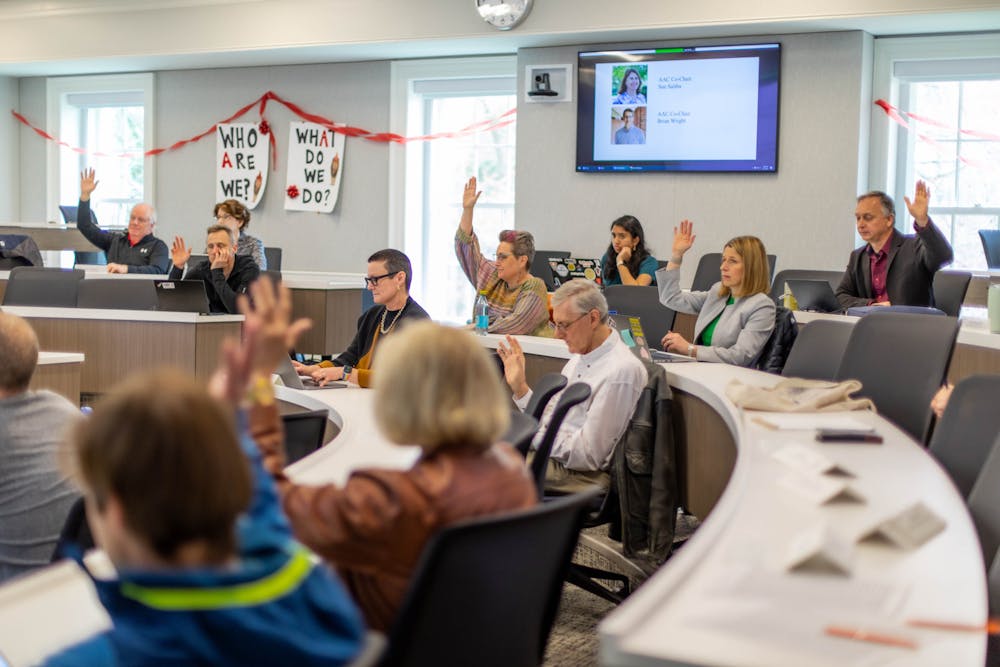The Faculty Senate discussed the results of the first University study of faculty and staff salaries since 2013 at their meeting Friday. The senate also discussed proposed changes to their bylaws and increasing reports of online aggression directed towards University faculty.
The presentation on the faculty salary study was given by Maite Brandt-Pearce, vice provost for faculty affairs. The study showed a 2 percent higher average pay for Asian faculty members who are tenured or on a tenure track, as compared to other tenured or tenure-track faculty members. Conversely, the study also showed a 6.9 percent lower average pay for Asian Academic General Faculty — referring to non-tenure or tenure track faculty members — compared to the rest of the general faculty.
The study was conducted by DCI Consulting, a firm external to the University, but done under the guidance of the University Counsel, which represents and advises the Rector and the Board of Visitors in legal affairs. The study included salaried academic faculty members in all academic units, excluding the School of Medicine and the University’s College at Wise, and is the first faculty salary study conducted since 2013. Brandt-Pearce said that the University aims to conduct these studies periodically to ensure that its pay practices are strong.
“We really care that faculty are paid fairly,” Brandt-Pearce said. “We want to continue to do these kinds of studies periodically just to ensure that our pay practices are strong, so expect to see these in the future.”
According to the faculty affairs website, salary studies are conducted as part of “best practice” compensation oversight to ensure that University pay programs are compliant with legal principles. Additionally, according to the report, The University will not adjust any individual’s salary based on these results alone. Before any salary changes are made, the Provost’s Office will investigate the pay disparity, then make any needed salary adjustments as part of the annual merit cycle.
The results for the study have been published on the Faculty Affairs website. An email will be sent to all faculty on Tuesday detailing the results.
Provost Ian Baucom also addressed the Senate regarding free expression and academic freedom. He expressed concerns over the rise of recent reports that some faculty members have received threatening email messages and have been the target of online aggression.
“I want to assure you that we stand ready to assist with everything we can to ensure your safety and your ability to pursue teaching as freely as consistent with our parallel commitments,” Baucom said.
Baucom emphasized the University’s commitment to free speech and free inquiry and acknowledged that faculty members are entitled to their own private political views. He encouraged faculty to think about how they can foster a space of free inquiry and expression while fulfilling their duties as educators and members of the University’s faculty.
“Academic freedom always matters,” Baucom said. “It matters the most when topics are controversial, or sensitive.”
The Senate also heard from Computer Science Prof. Aaron Bloomfield who presented an update on a proposed bylaw change for the Senate that was first introduced at a meeting earlier in the semester. The proposed change would remove the qualification that only full-time faculty are eligible to serve on the Senate. It would also raise the cap on Faculty Senate members from 80 to 83 to accommodate faculty who would become qualified to serve as senators if the full-time faculty requirement is repealed.
Education Associate Prof. Brian Pusser expressed concern over the addition of part-time senators, questioning whether or not they would have time to fulfill faculty and Senate duties together. While Bloomfield did not address the point of workload, he noted that the current bylaws could restrict an experienced professor interested in serving on the Senate from doing so.
“Let’s imagine you’re about to retire…[and] you go down to part-time for the last year or two,” Bloomfield said. “Under the current bylaws, you would not be allowed to be on the Senate. But I can imagine someone who’s winding down towards retirement wanting to still [serve].”
Due to confusion about whether or not the proposed bylaw change would allow all faculty — including part-time and adjunct faculty — to be voting members, the Senate decided to table a vote on this issue and will hear another update from Bloomfield at their next meeting.
“I also sort of see this as an iterative process where I'd like to make an improvement this time and then we can see how we are and we want to make a change next time,” Bloomfield said.
Additionally, Faculty Senate Chair Michael Kennedy announced that Governor Youngkin vetoed House Bill 1467, which was proposed by Del. Amy Laufer and would mandate that a non-voting member of the faculty and staff be added to the Board of Visitors without the need for approval by the General Assembly. While a non-voting faculty member position already exists in the University’s Board of Visitors, the existence of the position is currently not mandated by Virginia law, and those appointed to the position must be approved by the Board. In his veto statement, Youngkin stated that the addition would be costly, adding that there would be no elected official oversight for the addition of a non-voting member outside of Virginia’s public universities. Gov. Youngkin announced his actions on 50 bills last week, and Bill 1467 was part of 19 other bills that he vetoed.
The Senate will have their next full meeting April 19.
CORRECTION: A previous version of this article incorrectly stated that the proposed bylaw change would make all senators appointed rather than elected. The Faculty Senate discussed this topic, but this change is not in the formal proposal. The article has since been updated to correct this error.







